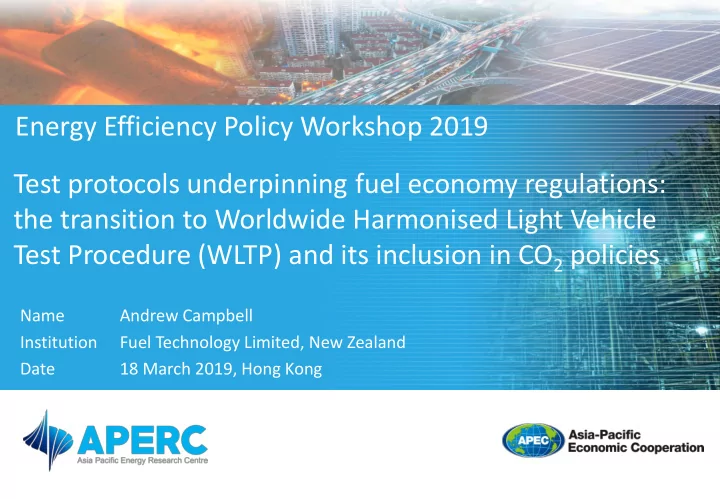

Energy Efficiency Policy Workshop 2019 Test protocols underpinning fuel economy regulations: the transition to Worldwide Harmonised Light Vehicle Test Procedure (WLTP) and its inclusion in CO 2 policies Name Andrew Campbell Institution Fuel Technology Limited, New Zealand Date 18 March 2019, Hong Kong
Why do we have standards? 2
Different forms of standards: Since start Mandatory Mar ‘18 (NZ wiring rules) RCD detail “it must be safe” Industry Voluntary Codes Level Best Practice Of Codes Oct ‘16 Stringency Type 2 Guidelines Socket Outlet Examples Facebook! Concepts Detailed Specificity 3
Vehicle Testing History 1950-60s: US studies identified vehicles as significant source of air pollution. 1960-70s: establishment of environmental agencies in California, then across US, later across Western Europe, Canada, Australia and Japan. Required ability to refer to results from a repeatable test that aimed to simulate typical vehicle use. Mid 1970s: tightening emission standards required de-tuning of engine resulting in higher fuel consumption. Energy crisis of 1970-80s fuel consumption result underpinned many energy reduction policy initiatives. Fuel consumption result now underpins many GHG reduction policy initiatives. 4
Vehicle Emissions (and Fuel Consumption) Testing: Mandatory $Billions at stake Industry Voluntary Codes Level Best Practice Of Codes Stringency Guidelines Examples Facebook! Concepts Detailed Specificity 5
Vehicle Emissions (and Fuel Consumption) Testing: $Billions at stake – test must be acceptable industry wide, repeatable and robust. Ideally providing a range of speeds and loads (and operating temperatures) representing typical vehicle use. Standardised: accurately specified to provide repeatability. Despite tight specification and staged development of previous tests: Experienced testers could “game” and get better results. Vehicles could be calibrated to (recognize and) perform well under the specific test conditions. Test cycle specification considered vehicle technology available at the time. Over time, greater divergence of test results and “real world” results. New technologies (e.g., EVs) not well catered for (New European Driving Cycle 20 years old). Different test cycles in different jurisdictions. Global vehicle supply more efficient/cost effective with one test (homologation). undermining policy efforts 6
Introduction of the Worldwide Harmonised Light Vehicle Test Procedure (WLTP) Development process began in 2007. Developed by the UN ECE GRPE (Working Party on Pollution and Energy) with inputs from wide-ranging economies. An approximation of real-world operation. Stricter test conditions, higher speeds, longer test duration. Consideration of vehicle’s “special equipment”, including weight of A/C units, aerodynamics, and others. Consideration of different power trains … EV technology. 7
The Test Arrangement 8
9
NEDC “Extra - urban” Combined MOTORWAY CITY Combined MOTORWAY WLTP RURAL TOWN CITY 10
New European Drive Cycle (NEDC) vs Worldwide Harmonised Light Vehicle Test Procedure (WLTP) 11
The WLTP for PEVs, PHEVs and (Non-P)HEVs EVs 12
Introduction of World Harmonized Light Vehicle Test Procedure (WLTP) 2021 for Emissions From 09/2018 2021 10/2018 modified version 2021 TBA 13
EU target WLTP timeframes Type Approval NEDC WLTP NEDC WLTP Customer Information NEDC NEDC based on WLTP Technical Docs (Cert. of Compliance) WLTP Labelling and taxation NEDC WLTP 2000 09/2017 09/2018 01/2019 2020 2021 14
Implications of Higher WLTP Value: Tax implications with g/km increase??? OEM obligations with g/km increase??? 150 g/km g/km +15-25% 120 g/km NEDC WLTP 15
Consequences of WLTP Introduction Vehicle Type Approval data uses WLTP test, but labelling still requires NEDC data high risk of confusing consumers where both NEDC and WLTP are displayed. European Union CO 2 targets for 2021, for vehicle manufacturers, based on old NEDC test. European Commission developed a WLTP NEDC translation algorithm. Not exact, which has potential for significant cost implications. UK example: changes to the label are proposed for April 2020, when taxation will switch from NEDC to WLTP. Yet to be determined how difference in fuel consumption result/tax will be managed. EU automotive industry suggesting revision of labelling once WLTP transition complete harmonised consumer information. 16
WLTP Summary Developed by the UN ECE GRPE (Working Party on Pollution and Energy ) Part of the Worldwide harmonized Light vehicles Test Procedures (WLTP). The WLTP procedures define a number of other procedures. Cycle based on real-driving data with low, medium, high and extra high speed sections expect closer to real-world fuel consumption. Phase-in began 2017. Few light vehicle models/vehicles now not tested to WLTP protocol. Introduction of modified form in Japan, and for exhaust emissions in China. Australia, India and South Korea will also implement the WLTP at a later stage Many factors involved in vehicle’s fuel consumption and CO 2 emissions. Despite expected improvements, care still required interpreting WLTP. Fuel consumption labelling and other use of WLTP data yet to catch up. 17
Thank You http://aperc.ieej.or.jp/ Thanks also to Gloria Esposita for supporting materials
Recommend
More recommend